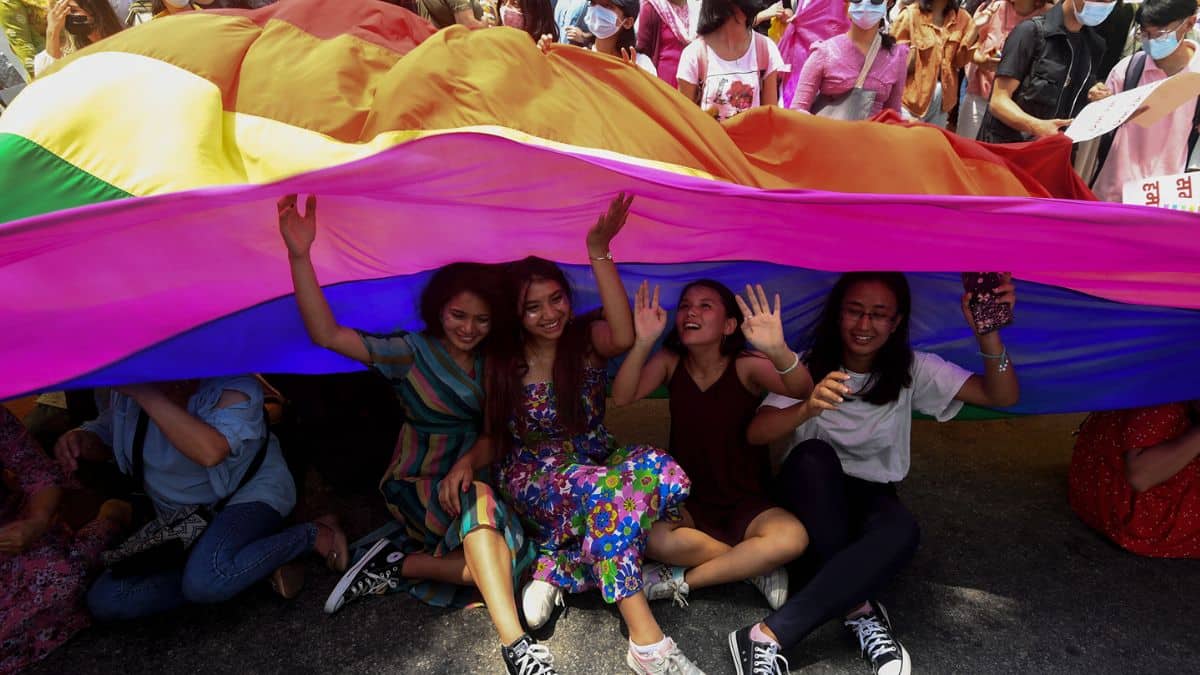 Image Credits - Foreign Policy
Image Credits - Foreign Policy
Nepal has achieved a significant milestone by becoming the first South Asian country to recognise queer marriage officially. The groundbreaking registration occurred in Lamjung, where 27-year-old Surendra Pandey and 37-year-old Maya Gurung formalized their union, five years after a temple ceremony.
Maya shared insights into their love story, saying that they met in a restaurant and immediately fell for each other. They moved in together after a few weeks of courtship. However, societal norms and resistance from family prompted the couple to relocate to Kathmandu. Despite marrying in a temple five years ago, their union lacked legal recognition until now.
Yuvaraj Adhikari, chairman of Dordi Rural Municipality, revealed that the couple’s registration request was submitted a week earlier, and following the Supreme Court’s interim order, their marriage was officially recorded at the ward office. This move aligns with the court’s directive allowing same-sex couples to register their marriages until a comprehensive legal framework is established.
In June, Nepal’s Supreme Court issued an interim order advocating for the registration of same-sex marriages, signalling a progressive stance on LGBTQ+ rights.
Before Nepal’s historic recognition of queer marriage, the issue of same-sex marriage has been a complex and often contentious matter globally. The treatment of LGBTQ+ rights has varied widely from country to country, and societal attitudes have played a crucial role in shaping policies.
Most countries did not legally recognize same-sex marriages, leading to disparities in rights and benefits for LGBTQ+ couples. In some places, these couples faced discrimination and were denied legal recognition and protection. Societal and religious beliefs often influence the acceptance or rejection of same-sex marriages. Cultural norms, deeply rooted traditions, and religious doctrines sometimes posed obstacles to legal recognition and societal acceptance.
Before Nepal’s decision, some countries experienced landmark legal cases that challenged the status quo. Courts in various nations have issued decisions either supporting or denying the right of same-sex couples to marry, leading to a patchwork of legal precedents globally. LGBTQ+ activists and advocacy groups have long been at the forefront of pushing for equal rights, including the right to marry. Their efforts involved legal challenges, awareness campaigns, and lobbying for legislative changes. Over time, there have been noticeable shifts in public opinion towards greater acceptance of LGBTQ+ rights. However, this shift was not uniform, and societal attitudes remained a significant factor influencing the legal landscape.
Nepal’s decision to officially register a queer marriage marked a significant turning point, providing a positive example of progress in a region where LGBTQ+ rights had faced challenges. As the first South Asian nation to officially recognize a queer marriage, Nepal sets a precedent that may influence other countries in the region and beyond. The positive response from rights activists underscores the significance of this step toward equality, fostering hope for further advancements in recognising and safeguarding LGBTQ+ rights globally.
The Way Forward
Nepal’s groundbreaking decision to legally recognize and validate same-sex marriages sets a crucial legal precedent, demonstrating that acknowledging such unions is feasible within existing frameworks. This move might prompt lawmakers in other nations to reassess and potentially amend their marriage laws. It reinforces the intersectionality of LGBTQ+ rights and human rights, compelling international advocacy groups to push for similar recognition in countries where such rights are still constrained.
The positive reception of Surendra and Maya’s marriage could contribute to a shift in public perceptions, fostering greater acceptance and challenging cultural norms.
Additionally, on a diplomatic level, Nepal’s stance may influence global discussions, increasing pressure on countries yet to embrace LGBTQ+ rights. The impact extends to legislative reforms, inspiring discussions and initiatives in other nations to safeguard the rights of LGBTQ+ individuals.
Regionally, as the first South Asian country to recognize a queer marriage, Nepal may catalyze a reevaluation of LGBTQ+ rights in neighbouring countries, influenced by shared cultural dynamics.
In essence, Nepal’s historic move has the potential to catalyze positive change on multiple fronts, influencing legal, societal, and diplomatic aspects of LGBTQ+ rights globally. It serves as a beacon of progress, demonstrating that recognizing and validating queer marriages is not only feasible but also a crucial step towards fostering inclusivity and equality.
Maya and Surendra, the couple at the heart of Nepal’s groundbreaking same-sex marriage recognition, embody the resilience and courage needed to challenge societal norms. Their union, now legally acknowledged, symbolizes not just a personal triumph but a catalyst for broader social change. Their journey challenges stereotypes and sparks conversations about love and acceptance. As trailblazers in a historic moment, their story amplifies the importance of representation and the power of personal narratives in reshaping cultural attitudes. In the face of adversity, Maya and Surendra’s commitment to each other becomes a testament to the transformative potential of love and the profound impact that individual stories can have on legal and societal landscapes. Their courage serves as an inspiration for others navigating similar paths and contributes to the ongoing global dialogue on LGBTQ+ rights.
